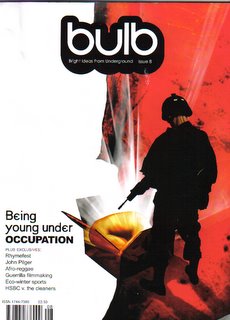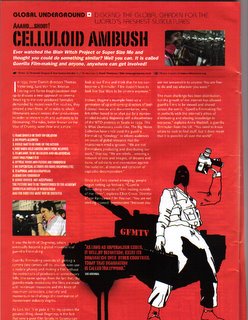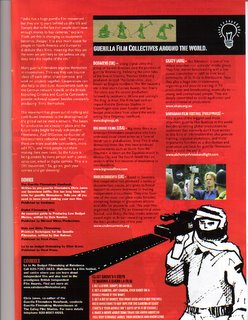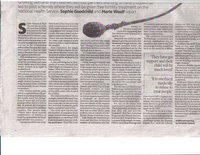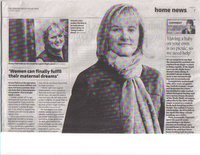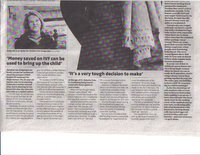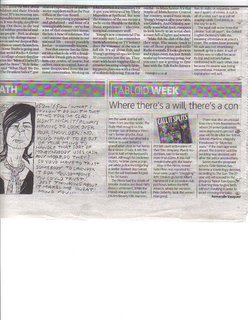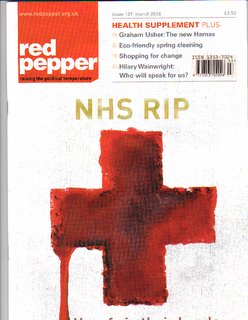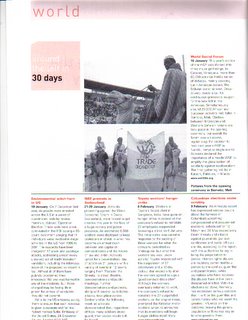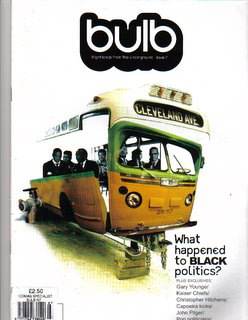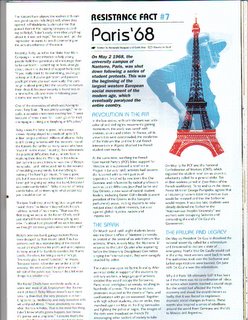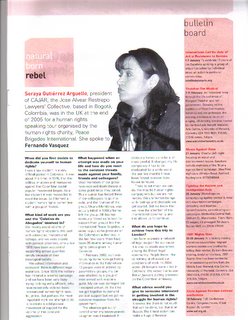Thursday, September 28, 2006
Threatening truth (2005)
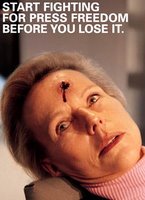
129 journalists dead in 2004
Freedom of the Press is being challenged. The international federation of journalists announced, a few weeks ago, that last year 129 journalists and media staff were killed “in action”, the worst record year so far. In an age where the world is so dependent on the media to report the truth, different journalist groups have started a campaign to bring the perpetrators to justice.
The 2004 IFJ report also mentions that state censorship and the constant intimidation journalists are faced with by the state and organized crime is intolerable and threatens the future of free press.
The 2003 report had already shown a worrying trend with 92 deaths, 22 more then in the previous year. Only in Iraq, 16 journalists were killed that year, not including the cases of Fred Nerac and Hussain Osman who are still missing and presumed dead in crossfire near Basra during the invasion. In the same year the missile attack on the “Palestine hotel” in Baghdad where 150 journalists were staying at, and the US troops attack on the offices of Al-Jazeera which killed Tareq Ayyoub ,received special attention and world condemnation as they were a clear attack on independent media. At the time, the IFJ called for 7 independent investigations but so far they have had little success.
7 dead in Colombia, including Juan Emitorio Rivas, a radio reporter famous for exposing political corruption, as well as 7 deaths in the Philippines have been singled out by the IFJ, completing the top 3 most dangerous areas for journalists. Palestine also deserved a special mention with the deaths of the Palestinian cameramen Nazeeh Darwazh and the freelance cameramen James Miller at the hands of the Israeli army.
In 2003, Asia had the worst record with 24 deaths followed by the Middle East with 23. Europe still counted 14 deaths.
Aidan White, the general secretary of the IFJ said in a press conference, “Behind each tragic death is a story of widespread intimidation and violence against journalists being carried on a large scale never seen before.” He went on to say, “There tends to be a few meaningless words of regret, a cursory inquiry and a shrug of indifference. It is inexcusable in an age when the world relies more then ever on media to tell the story that many governments fail to bring the killers of journalists to justice”.
The campaign led by the IFJ to reverse this critical situation came as a response to the Zahra Kazani incident in Iran, where the journalist was brutally tortured and killed in July 2003 while under police custody.
Robert Shaw, the IFJ Human Rights and Information Officer, said, “In order to put pressure on governments to support and protect journalists and media staffers, the global media community needs to increase efforts to ensure the practical implementation of existing international legal structures under the umbrella of the Geneva Conventions.” He added, “Organizations such as the European Union, the OSCE, the Council of Europe, the United Nations, etc, must be targeted to act as concrete intermediaries in order to push through this process. Aid should be checked and if necessary withdrawn when governments in these respective countries ignore basic humanitarian standards such as the freedom and safety of the press.”
The International News Safety Institute (INSI) was formed as a response, stating that journalists are not prepared to be intimidated and killed without a fight. Mr. Shaw said, “We believe that it is time for an international framework to be established to carry out independent investigations of the killing of journalists and media staff and to make the targeting and reckless neglect of journalists a war crime punishable under international law.”
The tragic death lists also hides another challenge journalists are forced to deal with nowadays, the increasing influence by corporate media groups and the state on free press. Corporate influence became major news in the mid-nineties with the Prosilac case. Fox news reporters, Steve Wilson and Jane Akre, exposed a complex network established by the chemical giant Monsanto in order to put RBGH, an artificial hormone that increases milk production and has been proven to be harmful to humans, on the market. The report described a series of corruption cases that later received attention by Canada and Europe who never considered RBGH to be a safe product. Faced with a lawsuit and the loss of advertising funds, Fox news began an 8 month campaign of intimidation towards Akre and Wilson, and eventually fired them for refusing to make drastic changes to their report. The journalists sued Rupert Murdoch`s Fox news and received 425 thousand dollars in compensation. The sentenced was later annulled when 5 major media corporations, including Media General and Newsweek, filled a complaint on the grounds that falsifying news was not illegal.
Robert Shaw said, “In order to fight this trend, the international media community must take a stance in order to push authorities to work harder to strike a balance between upholding the law and respecting civil liberties.”
In Britain, the similar case last December of the independent media center’s (indymedia) server being confiscated by the FBI, under an international security agreement, and without an explanation, raised questions of censorship.
Shaw said, “the attack on Indymedia late last year was most certainly a form of censorship. In fact, such actions demonstrate an increasing US government policy campaign to use other governments to push their own agenda”. He added,” The IFJ will continue to drive for greater protection of independent media such as Indymedia, who’s ability to exist and function effectively is essential to the strengthening of social democratic values in a globalised world plagued by the post 9-11 terrorism crackdown on civil liberties and freedom of the press”.
2004 was a dark year for journalism. Drastic changes need to be taken forward in the future to reverse this eminent threat to press freedom. If measures are not taken quickly, fair journalists are a race sentenced to extinction.
Election report

Pre-election tension in Portugal
What future for Portugal? Last Sundays elections gave an historical victory to the socialist Party (PS) who won a majority in parliament of 45%. Portugal turned to the left, and for the first time in 30 years there is a majority of leftists parties in parliament, of about 59%.
Behind the figures hides a continuous climate of political instability that threatens a prosperous future for the Mediterranean state.
After 3 consecutive governments failing to complete their mandate president Jorge Sampaio decided to dissolve the parliament and call for early elections. The main reasons behind the dramatic decision was the sharp rise in unemployment and a series of scandals that shook the Portuguese establishment.
For a while now there is talks of a collective depression that is forcing Portugal to stagnate. The lack of democratic alternative and a significant variety of political projects has created a depressing atmosphere.Uncharacteristically, after the results of the election were made public there was no major popular celebration in the streets. No doubt the people were happy to get rid of the center right-coalition of the social democrats (PSD) and the neo-conservatives (CDS), but the Portuguese are far from being optimistic about the future.These results instead of clearing up the general confusion have only contributed to further instability.
Within the new opposition both major candidates have announced their departure from politics. The still ruling Prime Minister Pedro Santana Lopes, after weeks of a victimizing electoral campaign, showed his disappointment with his own party. When the results came out he said, “We have not fulfilled our objectives. We have fail Portugal and ourselves. But what makes me sadder is that key elements within our party contributed to our downfall”.In fact, within one hour after Santana’s announcement 2 major key figures in PSD, an internal affairs minister in the nineties, Marques Mendes, and the city Mayor of Vila nova de Gaia, Filipe Menezes, announced their nominations for the leadership of the party.Alberto Joao Jardim, the controversial long time leader of Madeira said, “Some elements in our party should be more careful. This was a humiliatingly defeat, and at the moment it is necessary to reflect peacefully about the future”.Nevertheless other figures in the party already shown their support for quick change. Teresa Gouveia, ex-foreign affairs Minister, has shown her support for Mendes. She said, “PSD, confronted with this defeat is in need of dramatic change, which will allow us to return the party to itself and Portugal”. She added, “Our party has to become a credible and serious opposition and has to fight bravely in the next two battles, the local elections and in the future Presidentials.”Filipe Menezes has also received letters of support and all around the country there are rumors that Manuela Ferreira Leite, an ex-education minister terribly unpopular among students, will be announcing her nomination soon.The division in the party between those who want change and those who do not is only too obvious and will inevitably be very damaging for the party.
The neo-conservatives (CDS) have also seen better days. Their popular leader was one of the few members of the still ruling government that stands firm in terms of popularity, but also feels his time has passed. He said, “It is time for CDS-PP to find a new path.”Many voices in the party have asked the leader to reconsider, in particular senior members of JP (Popular Youth), the youth militancy of CDS. Joao Almeida, Leader of the JP in Porto, said, “We do not give up on Dr Paulo Portas, in the name of the Portuguese youth that does not believe in this new path”. Antonio Pires de Lima, CDS vice-president, said, “I will not side with these appeals, because for me before the politician there is the men. I have been friends with Mr. Portas for 36 years and I must respect the decision he has taken.” He went on to say, “I will not be a nominee. I believe Telmo Correia, who is still our tourism minister, is a positive alternative for the leadership of the party”.
While both the major right-wing parties sink deeper in division the left although apparently being united, is also deeply divided.The Portuguese communist party (PCP) became the third strongest party in parliament but failed to form a coalition with the socialists to defeat the right, a tactic so often used in the past.
The Portuguese left block was also another great winners in these election as they went up from 3 MPs to 8. Anticipating a clear socialist victory they promised a fierce opposition to the future socialist government.
Within the victorious Socialist party there are also some elements of dissent, namely those behind the famous writer and MP Manuel Alegre, who came second in the recent internal socialist elections. The current leader, and future Portuguese Prime Minister, Jose Socrates is a somewhat sinister figure. The public is aware of Socrates limitations but the word in the streets is that the next government will indirectly be conducted by Antonio Vitorino, the ex European commissioner for Human rights.Francisco Almeida, a high rated lawyer from Lisbon wrote, “In one side it is positive to have a Vitorino in the field in compensation for the rubbish that Socrates will inevitably concentrate in this socialist government. Altogether, there is hope.”
Abstention in the elections went down significantly. But two factors led us to believe the Portuguese are searching for alternatives. Blank votes doubled and the only party that has presented a dramatically different project, the left block, more then doubled their power in parliament. Most of those votes were from young people, showing a new generation tired of the two party hegemony (PSD and PS) that has controlled post-revolutionary politics in Portugal.It is impossible to speculate precisely about the future, but whatever it will be, it will not be easy.
Olympic Dream (May 2005)

The doubts behind London’s Bid
The campaign to support London’s Olympic bid is gaining momentum as we approach the final decision this coming July. Millions of pounds have been spent already in the project but nevertheless there hasn’t been yet a full-scale public debate explaining the details and implications of the project. Support for the bid is growing but so is the resistance to London’s aspirations to hold the Olympic games in 2012.
The results of a government commissioned pool showed 73% of the people consulted supported the bid even after learning about the financial implications. Several key figures in politics and sports have also come out to support the bid. The government says the project is a unique opportunity to regenerate East London, that it will create over 3000 jobs, attract a record-breaking number of tourists and leave a feel-good atmosphere behind. Many factors make of London a possible winner. Several corporate sponsors have already shown support for the bid and venues such as Wimbledon, the Dome, Alexandra Palace and Excel exhibition center can be easily converted to attend sporting events.
Most of the other bids present little opposition to London. New York’s bid has been overshadowed by a row over the building of one venue, and the United Sates already hosted recently the summer Olympics in Atlanta and the winter games in Salt Lake City. Madrid received compliments from the IOC but Barcelona hosted the games in 1992. Istanbul, Moscow, leipzeist, Rio de Janeiro and Havana have been struggling with local support from business. London’s main rival is Paris who is leading the race as most of its venues are ready and transport facilities in the French capital are superb. On the other hand there are many obvious factors that complicate London’s chances. For a long time the city has been struggling with transport regeneration. The privatization of the tube has been in the public agenda for almost a decade now and has seen little results. The city’s problems to receive the usual flow of tourists that visit during the high seasons would definitely worsen during the games, diminishing the tourism boosting argument. The two locations short listed for the building of the Olympic village are somewhat problematic. The Land Development Agency has already bought some land in Hackney Wick but the area has precarious transport links. Stratford Rail yards are heavily populated and issues related to congestion could create serious difficulties.
Sir bob Scott, who organized the Manchester’s Commonwealth games and two failed Olympic Bids, supported the bid initially but changed his mind recently. He said, “The fiasco over the 2005 World Athletics championship bid has damaged London’s credibility and let’s be honest, Paris has a much better chance.”
Resistance to the bid has increased steadily. The Green party and many other social movements and associations have organized a large-scale campaign against it. Their main march during the reception to the IOC on the 19th of February saw significant popular support. In fact, while most British people believe holding the games is a great idea, local residents in Stratford and Hackney are skeptical about the project.
Tessa Jowel, Culture Secretary, said the costs of holding the games are estimated to be of £2.375 Billion. Council Tax bills in east London are expected to be raised by £20 if the bid is successful.
Annie Rollington, a Greenwich resident, said, “It will cost an obscene amount of money. It should be spent somewhere else like the NHS.” She added, “After the Millennium Dome fiasco you would imagine they had learnt the lesson. Most people in my community oppose the bid. I would much rather see the mayor make some effort to extend tube lines to south London then waist his time with some silly games.”
London Metropolitan police has recently reinforced the threat of terrorist attacks in London, and holding such an event would obviously make the city a more relevant target.
Kevin Blowe, an anti-Olympic bid activist and one of the main organizers of the no-bid campaign, said, “The games will be a financial and environmental disaster. They will lead to even more draconian anti-terror and public order legislation.” He went on to say, “They say anyone raising concerns about the astronomical £2.375 Billion, that will have to be spent between 2005 and 2012, is likely to be written off as opposing much needed regeneration of a socially deprived area. This has closed the public debate on the issue.” Mr Blowe has also raised controversial questions against all arguments to host the games. He claims arguments that the project will develop environmental structures in the city is a lie. “They use as example of their environmental intentions the Lower Lea Valley project. But the project has been discussed for years and it will go through with a bid or without a bid”. He has criticized the government accusing it of lying to the public. “They say the games will create over 3000 jobs. They said the same during the building of the Dome and Excel center in Canning town. Now we know it was false. For instance Newham continues with a high unemployment rate even after a £30 Million regeneration project”. “Worst of all the government has already admitted the new cross rail scheme will not be ready by 2012, while the BAA has made clear that without 3 new runaways it will be impossible to hold the games. BAA, British Airways and Virgin Airline are all corporate sponsors of the bid, what are the odds of them getting their way”?
The games are presented as a unique chance to solve many local problems, but recent sporting events have shown the contrary, even after being declared a success.
Zoe Skinner and Jackie Jonn, two Australians currently living in London, said, “the games in Sydney were great. But recently the government came out to say it actually made a loss in the end. We find it hard to believe London has the capacity to do well. Besides being expensive, Sydney triumphed because it is an open city with lots of free space. London is quite the contrary.”
Last summers two main sporting events, despite the apparent success, were surrounded in controversy. Euro2004 was declared the best European championships ever and Portugal was taken by a wave of patriotism never experienced before. Nevertheless the project costed 3 times more what it was initially estimated. Gilberto Madail, President of the Portuguese football federation said, “I was proud of being Portuguese. All the efforts were worth it, but unfortunately we did not profit as much as we expected.” The case of Algarve’s stadium shows clearly one of the problems of hosting such a big event. 31 Million euros were spent to build the stadium, which hasn’t been used since the championship, and there are no planned events for 2005. The situation led the Portuguese to rename it “white elephant”. The same has happened in Athens after the last Olympic Games.
Altogether it is important to build an open public debate before spending such vast amounts of money in one project and so far there has been little detailed talk about the project. No one questions if the games would be a success but it is impossible not to ask questions relating to the viability of the project.
